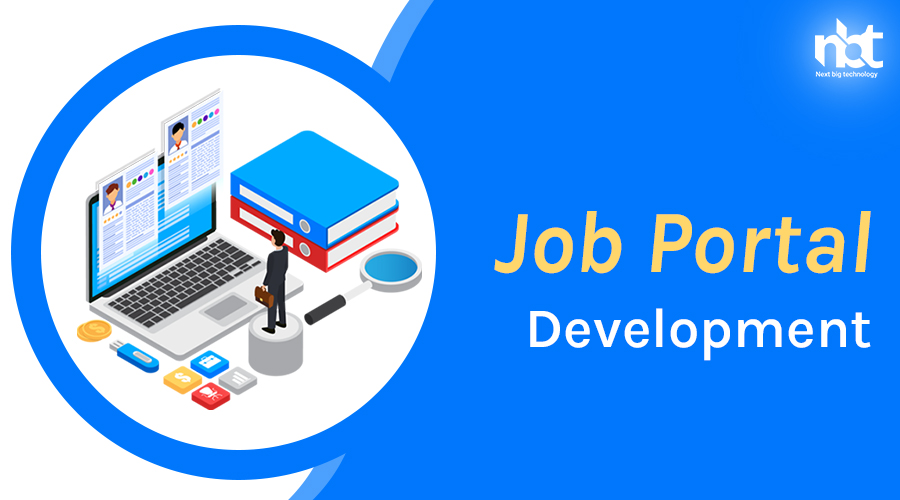Table of Contents
Job Portal Development Services
In today’s dynamic job market, the importance of efficient recruitment processes cannot be overstated. As businesses strive to attract top talent and individuals seek fulfilling career opportunities, the role of job portals has become indispensable. Job portal development services offer a comprehensive solution to streamline the hiring process, connect employers with candidates, and foster professional growth. Let’s delve into the realm of job portal development services and explore how they can pave the way for organizational success.
Understanding Job Portal Development Services
Job portal development services encompass a range of solutions tailored to meet the diverse needs of businesses, recruitment agencies, and job seekers. These services entail the creation, customization, and maintenance of online platforms dedicated to job listings, candidate profiles, and recruitment management. By leveraging cutting-edge technologies and intuitive interfaces, these portals facilitate seamless interactions between employers and job seekers, optimizing the hiring process for all stakeholders involved.
Key Features and Functionality
A well-designed job portal offers a myriad of features designed to enhance user experience and streamline recruitment efforts. Some key functionalities include:
- Job Listings: Employers can post job vacancies with detailed descriptions, requirements, and application procedures.
- Candidate Profiles: Job seekers can create personalized profiles showcasing their skills, experience, and qualifications.
- Search and Filtering: Advanced search options enable users to refine job listings based on criteria such as location, industry, and job type.
- Application Management: Employers can manage incoming applications, track candidate progress, and schedule interviews within the portal.
- Communication Tools: Integrated messaging systems facilitate seamless communication between employers and candidates, fostering effective dialogue throughout the hiring process.
- Analytics and Reporting: Comprehensive analytics dashboards provide valuable insights into recruitment metrics, enabling data-driven decision-making and performance evaluation.
Advantages of Job Portal Development Services
Investing in job portal development services offers numerous benefits for both employers and job seekers:
- Increased Efficiency: Automated processes and intuitive interfaces streamline recruitment workflows, saving time and resources for employers.
- Wider Reach: Job portals transcend geographical boundaries, enabling employers to reach a diverse pool of talent irrespective of location.
- Enhanced Visibility: Organizations can enhance their brand visibility and attract top talent by showcasing their employer brand through customized company profiles.
- Improved Candidate Experience: User-friendly interfaces and personalized recommendations enhance the overall candidate experience, leading to higher engagement and retention rates.
- Data-Driven Insights: Analytics tools provide valuable insights into recruitment trends, enabling organizations to refine their hiring strategies and improve decision-making.
How to Create a Job Portal Development
In today’s dynamic job market, the demand for efficient job portals is soaring. As businesses expand and job seekers explore new opportunities, the need for a robust platform connecting employers and candidates becomes increasingly evident. If you’re considering venturing into the realm of job portal development, you’re on the right track. In this guide, we’ll walk you through the essential steps to create a job portal that stands out in functionality and user experience.
- Market Research: Before diving into development, conduct thorough market research to understand the needs and preferences of both employers and job seekers. Identify your target audience, analyze competitors, and pinpoint gaps in existing job portals.
- Define Your Unique Selling Proposition (USP): Differentiate your job portal by offering unique features or catering to a specific niche. Whether it’s advanced search filters, personalized recommendations, or industry-specific portals, determine what sets your platform apart.
- Choose the Right Technology Stack: Selecting the appropriate technology stack is crucial for the scalability, security, and performance of your job portal. Consider factors such as database management systems, programming languages, frameworks, and hosting solutions based on your project requirements and budget.
- Design an Intuitive User Interface (UI): A user-friendly interface is paramount for enhancing the user experience. Design a visually appealing layout with easy navigation, clear call-to-action buttons, and responsive design to ensure seamless accessibility across devices.
- Develop Core Features: Focus on building essential features that facilitate job search, application, and recruitment processes. Key functionalities include user registration, job posting, resume upload, advanced search filters, application tracking, and communication channels between employers and candidates.
- Implement Advanced Search and Matching Algorithms: Enhance user experience by integrating intelligent search and matching algorithms. Utilize machine learning and AI technologies to analyze user preferences, skills, and job requirements, providing personalized recommendations and improving job matching accuracy.
- Ensure Security and Data Protection: Prioritize data security by implementing robust encryption protocols, user authentication mechanisms, and compliance with data protection regulations such as GDPR. Regular security audits and updates are essential to safeguard sensitive information.
- Optimize for SEO and Mobile Devices: Maximize the visibility of your job portal by optimizing it for search engines and mobile devices. Employ SEO best practices, including keyword optimization, meta tags, and structured data markup, to improve search engine rankings and attract organic traffic.
- Test and Iterate: Conduct rigorous testing across various devices and browsers to identify and rectify any bugs or usability issues. Gather feedback from beta testers and continuously iterate based on user input to enhance functionality and user experience.
- Launch and Promote Your Job Portal: Once fully developed and tested, launch your job portal and devise a comprehensive marketing strategy to attract users. Leverage social media, email marketing, content marketing, and partnerships with industry stakeholders to increase visibility and user engagement.
Why Should You Go for Job Portal Development
In today’s fast-paced digital era, the significance of job portals cannot be overstated. Whether you’re an entrepreneur, a recruitment agency, or a large corporation, having your own job portal can offer numerous advantages. Let’s delve into why investing in job portal development could be a game-changer for your business.
- Expanded Reach: With a custom job portal, you can reach a wider audience of job seekers beyond traditional methods. It allows you to tap into a global talent pool, attracting qualified candidates from diverse backgrounds and locations.
- Cost Efficiency: Compared to traditional recruitment methods like newspaper ads or physical job fairs, a job portal is a cost-effective solution. Once developed, the portal can automate many processes, reducing the need for manual intervention and saving both time and money in the long run.
- Streamlined Recruitment Process: Job portals streamline the entire recruitment process, from posting job openings to managing applications. Features like resume parsing, candidate filtering, and automated notifications simplify the task of finding the right talent, making the process more efficient for recruiters.
- Enhanced Brand Visibility: A well-designed job portal not only facilitates recruitment but also serves as a powerful branding tool. It reflects your company’s values, culture, and professionalism, thereby enhancing your brand image in the eyes of potential candidates and clients.
- Data-Driven Insights: Job portals provide valuable insights into recruitment trends, candidate behavior, and hiring metrics. By analyzing this data, businesses can make informed decisions to optimize their recruitment strategies and improve overall efficiency.
- Customization Options: One of the key benefits of developing your own job portal is the ability to customize it according to your specific requirements. Whether it’s integrating with your existing HR systems, implementing unique features, or aligning with your brand identity, a custom solution offers unmatched flexibility.
- 24/7 Accessibility: Unlike traditional recruitment methods that are limited by time and location, a job portal is accessible round the clock from anywhere with an internet connection. This ensures that your job openings are always visible to potential candidates, increasing the chances of finding the right talent quickly.
- Scalability: As your business grows, so do your recruitment needs. A well-developed job portal can scale effortlessly to accommodate increasing job listings, user traffic, and functionality requirements, ensuring that it remains a valuable asset for your organization in the long term.
Market Prospects of Custom Job Portal Development
In today’s rapidly evolving job market, the demand for efficient and tailored recruitment solutions has never been higher. Custom job portal development stands at the forefront of this demand, offering businesses the opportunity to create specialized platforms that cater to their unique hiring needs. As technology continues to revolutionize the way we approach talent acquisition, the market prospects for custom job portal development are undeniably promising.
Meeting Diverse Industry Needs: One of the key advantages of custom job portal development lies in its ability to cater to diverse industry requirements. Whether it’s healthcare, finance, IT, or manufacturing, businesses across various sectors are seeking specialized talent to drive their growth. Custom job portals allow companies to create tailored platforms that align perfectly with their industry-specific demands, offering features and functionalities designed to streamline the recruitment process.
Enhanced User Experience: In today’s digital age, user experience plays a pivotal role in the success of any online platform. Custom job portals empower businesses to prioritize user experience by incorporating intuitive interfaces, personalized dashboards, and seamless navigation. By providing candidates and employers with a user-friendly environment, custom job portals enhance engagement, increase retention rates, and ultimately drive better recruitment outcomes.
Scalability and Flexibility: Another significant advantage of custom job portal development is its scalability and flexibility. As businesses grow and evolve, their recruitment needs often change. Off-the-shelf solutions may lack the flexibility to adapt to these evolving requirements. Custom job portals, on the other hand, can be easily scaled and customized to accommodate changing needs, ensuring that businesses can efficiently manage their recruitment processes regardless of their size or complexity.
Integration with Advanced Technologies: The integration of advanced technologies such as artificial intelligence (AI) and machine learning (ML) is revolutionizing the recruitment landscape. Custom job portals allow businesses to leverage these technologies to automate various aspects of the hiring process, from resume screening and candidate matching to interview scheduling and onboarding. By harnessing the power of AI and ML, custom job portals enable businesses to make data-driven decisions, optimize their recruitment strategies, and ultimately secure top talent more effectively.
Competitive Advantage: In today’s competitive job market, attracting and retaining top talent is essential for business success. Custom job portals offer businesses a competitive advantage by enabling them to differentiate themselves through unique branding, tailored messaging, and personalized candidate experiences. By aligning their recruitment efforts with their employer brand and values, businesses can attract the right talent that fits their organizational culture and drives long-term success.
Essential Features of a Job Portal Development
In the contemporary professional landscape, job portals play a pivotal role in connecting job seekers with employers, facilitating a streamlined recruitment process. As the demand for online recruitment platforms continues to surge, it becomes imperative to understand the essential features that make a job portal development project successful. Let’s delve into the key components that contribute to the effectiveness of a job portal:
- User-Friendly Interface: A user-friendly interface is paramount to ensure seamless navigation for both job seekers and employers. Intuitive design elements, easy-to-use search filters, and clear categorization of job listings enhance user experience, encouraging prolonged engagement on the platform.
- Advanced Search and Filtering Options: Job portals should offer robust search functionalities, allowing users to refine their job searches based on criteria such as location, industry, experience level, and specific keywords. Advanced filtering options enable job seekers to find relevant opportunities efficiently, while employers can target candidates with precision.
- Comprehensive Job Listings: A diverse range of job listings across various industries and sectors is essential to cater to the diverse needs of job seekers. The job portal should feature comprehensive and up-to-date listings, including full-time, part-time, remote, freelance, and internship opportunities, providing ample choices for candidates.
- Personalized User Profiles: Personalized user profiles empower job seekers to showcase their skills, qualifications, and employment preferences effectively. Additionally, employers can create detailed company profiles to highlight their culture, values, and job openings, fostering transparency and trust between both parties.
- Seamless Communication Channels: Effective communication channels such as messaging systems, email notifications, and real-time alerts facilitate prompt interactions between job seekers and employers. Seamless communication enhances engagement and expedites the hiring process by enabling swift responses to queries and interview scheduling.
- Applicant Tracking System (ATS): An integrated ATS streamlines the recruitment workflow for employers by managing job applications, tracking candidate progress, and organizing applicant data efficiently. ATS functionalities such as resume parsing, candidate ranking, and interview scheduling automate tedious tasks, saving time and resources.
- Mobile Compatibility: In today’s mobile-centric world, job portals must be optimized for seamless access across multiple devices, including smartphones and tablets. Mobile compatibility ensures uninterrupted access to job listings and application processes, catering to the needs of on-the-go job seekers and busy professionals.
- Data Security and Privacy: Robust data security measures safeguard sensitive information shared by users, including personal details, resumes, and communication logs. Implementing encryption protocols, secure authentication mechanisms, and regular security audits instills confidence in users regarding the confidentiality and integrity of their data.
- Analytics and Reporting Tools: Analytics and reporting tools provide valuable insights into user behavior, job market trends, and recruitment metrics, enabling administrators to make informed decisions and optimize the platform’s performance. Comprehensive analytics empower stakeholders to track key performance indicators (KPIs) and refine their strategies accordingly.
- Scalability and Flexibility: A scalable and flexible architecture enables job portals to accommodate growth and adapt to evolving market dynamics seamlessly. Modular design principles, cloud-based infrastructure, and scalable database solutions ensure optimal performance, even during peak traffic periods or expansion phases.
Advanced Features of a Job Portal Development
In today’s fast-paced digital age, job portals have become indispensable tools for both job seekers and recruiters. As technology continues to evolve, job portal development has advanced significantly, offering a plethora of features designed to streamline the hiring process and improve user experience. Let’s delve into some of the advanced features that modern job portals boast, revolutionizing the way people find employment opportunities and companies hire talent.
- AI-Powered Job Matching Algorithms: One of the most groundbreaking advancements in job portal development is the integration of artificial intelligence (AI) algorithms. These algorithms analyze job seeker profiles, skills, and preferences, matching them with relevant job listings. By leveraging machine learning, job portals can deliver highly personalized recommendations, saving time for both job seekers and recruiters and ensuring better-fit placements.
- Advanced Search and Filters: Gone are the days of sifting through countless irrelevant job listings. Advanced search and filtering options allow users to narrow down their job search based on specific criteria such as location, industry, salary range, and required skills. This granular level of customization enables job seekers to find positions that align closely with their preferences and qualifications, enhancing the overall user experience.
- Mobile Optimization and Responsive Design: With the proliferation of smartphones and tablets, job seekers expect seamless access to job listings on their mobile devices. Modern job portals prioritize mobile optimization and responsive design, ensuring that users can easily browse, apply for jobs, and manage their profiles on any device. This accessibility not only enhances user experience but also expands the reach of job listings to a broader audience.
- Video Resumes and Interviews: Traditional resumes are evolving with the integration of multimedia elements such as video resumes. Job portals now allow candidates to upload video introductions or presentations, showcasing their personality and communication skills to potential employers. Moreover, some platforms facilitate video interviews, enabling remote screening of candidates and streamlining the recruitment process.
- Candidate Assessments and Skill Testing: To ensure the quality of candidates, many job portals offer built-in assessment tools and skill testing modules. Employers can create customized assessments to evaluate candidates’ skills and competencies directly within the platform. This feature not only saves time in the initial screening process but also provides valuable insights into candidates’ capabilities.
- Integrated Messaging and Communication Channels: Effective communication between employers and candidates is essential throughout the hiring process. Advanced job portals feature integrated messaging systems and communication channels that facilitate seamless interaction between recruiters and applicants. Whether scheduling interviews, providing feedback, or negotiating terms, these built-in communication tools streamline the hiring process and foster better candidate engagement.
- Data Analytics and Reporting: Data-driven insights play a crucial role in optimizing recruitment strategies and improving hiring outcomes. Job portals equipped with robust analytics and reporting capabilities allow employers to track key metrics such as application conversion rates, time-to-hire, and candidate demographics. By leveraging these insights, recruiters can make informed decisions, refine their recruitment strategies, and enhance overall efficiency.
Job Portal Development Timelines
In today’s fast-paced digital world, job portals have become an integral part of the recruitment process for both employers and job seekers. These platforms offer a convenient and efficient way to connect talent with opportunities. However, developing a successful job portal requires careful planning, execution, and adherence to specific timelines. In this guide, we’ll explore the key steps involved in job portal development and outline a realistic timeline for each stage.
- Market Research (1-2 weeks): Before diving into development, it’s crucial to conduct thorough market research to understand the competitive landscape, target audience, and industry trends. This phase involves gathering data on existing job portals, identifying gaps in the market, and defining your unique selling points (USPs).
- Planning and Requirement Analysis (2-3 weeks): Once you have a clear understanding of the market, it’s time to define the scope of your job portal. Collaborate with stakeholders to gather requirements, prioritize features, and create a detailed project plan. This phase also involves wireframing and prototyping to visualize the user interface and user experience (UI/UX) design.
- Technical Architecture (1-2 weeks): The technical architecture lays the foundation for your job portal’s development. This stage involves choosing the right technology stack, database structure, and server infrastructure based on scalability, security, and performance requirements.
- UI/UX Design (3-4 weeks): Design plays a crucial role in attracting users and providing a seamless browsing experience. Work closely with designers to create intuitive interfaces, responsive layouts, and visually appealing graphics. Conduct user testing and iterate designs based on feedback to ensure optimal usability.
- Frontend Development (4-6 weeks): Frontend development involves translating the UI/UX designs into code using HTML, CSS, and JavaScript frameworks like React or Angular. Focus on creating a responsive and accessible interface that works seamlessly across different devices and browsers.
- Backend Development (6-8 weeks): Backend development involves building the server-side logic, database management, and integration with third-party services like payment gateways and APIs. Choose a robust backend framework like Django, Node.js, or Laravel to ensure scalability, security, and performance.
- Integration and Testing (2-3 weeks): Integration involves connecting the frontend and backend components and testing the system as a whole to ensure all features work as expected. Conduct rigorous testing, including functional testing, usability testing, and security testing, to identify and fix any bugs or issues.
- Deployment and Launch (1-2 weeks): Once the development and testing phases are complete, it’s time to deploy the job portal to a production environment. Configure servers, set up monitoring tools, and perform final checks to ensure everything is ready for launch. Coordinate marketing efforts to promote the job portal and attract users.
- Post-launch Support and Maintenance (Ongoing): Job portal development doesn’t end with the launch; it requires ongoing support and maintenance to address user feedback, fix bugs, and introduce new features. Establish a support system, monitor performance metrics, and regularly update the portal to stay competitive in the market.
How Much Does It Cost to Build a Job Portal Development?
In the digital age, where technology permeates every aspect of our lives, job hunting and recruitment have also undergone a significant transformation. Job portals have emerged as powerful platforms connecting employers with potential candidates, streamlining the hiring process, and offering convenience to both parties. However, for those considering venturing into the realm of job portal development, understanding the costs involved is crucial. Let’s delve into the intricacies of estimating the expenses associated with building a job portal.
- Platform Development: The foundation of any job portal lies in its platform. Building a robust, user-friendly, and feature-rich website or application requires substantial investment. The costs can vary based on factors such as the complexity of features, design elements, and scalability requirements. Typically, hiring developers and designers to create a custom platform tailored to your specific needs can incur significant expenses.
- Functionality and Features: The success of a job portal hinges on its functionality and features. From job listing and search functionalities to resume upload, applicant tracking systems, and communication tools, each feature adds to the overall cost. Integrating advanced features like AI-driven candidate matching algorithms or video interviewing capabilities may incur additional expenses but can enhance the portal’s value proposition.
- User Experience (UX) Design: A seamless user experience is paramount for engaging both employers and job seekers. Investing in UX design ensures intuitive navigation, visually appealing layouts, and responsive interfaces across devices. While this may involve hiring experienced designers and conducting user testing, prioritizing UX design can significantly impact the portal’s success and user retention rates.
- Data Security and Compliance: Job portals handle sensitive personal and professional data, making security a top priority. Implementing robust security measures, encryption protocols, and compliance with data protection regulations (such as GDPR or CCPA) are essential but can add to the development costs. Investing in security upfront not only protects user data but also fosters trust among stakeholders.
- Integration with Third-Party Services: To enhance functionality and provide a comprehensive experience, job portals often integrate with various third-party services. This includes payment gateways for premium listings, background verification services, or social media platforms for seamless user authentication and sharing. While these integrations offer added value, they also entail additional costs and technical complexities.
- Maintenance and Support: Building a job portal is not a one-time endeavor; it requires ongoing maintenance, updates, and technical support to ensure optimal performance and scalability. Budgeting for post-launch maintenance, bug fixes, feature enhancements, and server hosting fees is essential for the long-term sustainability of the portal.
- Marketing and Promotion: Launching a job portal is just the beginning; attracting users and establishing a strong presence in the competitive market requires strategic marketing and promotion efforts. Allocating budget for digital marketing campaigns, search engine optimization (SEO), content creation, and branding initiatives is crucial for driving traffic and user engagement.
How to Create a Job Portal Development – Team and Tech Stack
In the contemporary job market, where technology reigns supreme, creating a job portal demands a strategic blend of expertise and technology. From conceptualization to implementation, every step requires meticulous planning and execution. In this guide, we delve into the crucial aspects of developing a job portal, focusing on assembling the right team and selecting the appropriate technology stack.
Assembling the Dream Team:
- Project Manager:
- The cornerstone of any successful project, a project manager oversees the entire development process. They ensure timely delivery, manage resources effectively, and keep all team members aligned with project goals.
- UI/UX Designer:
- A user-friendly interface is paramount for attracting and retaining users. The UI/UX designer crafts visually appealing layouts and ensures seamless navigation, enhancing the overall user experience.
- Frontend Developer:
- Responsible for bringing the designs to life, frontend developers use languages like HTML, CSS, and JavaScript to create interactive and responsive web pages. Their role is crucial in ensuring compatibility across various devices and browsers.
- Backend Developer:
- Backend developers build the server-side infrastructure, handling tasks like user authentication, database management, and application logic. They work closely with frontend developers to ensure smooth communication between the user interface and the server.
- Database Administrator:
- Managing vast amounts of user data requires a robust database system. A database administrator designs and maintains the database architecture, optimizing performance and ensuring data security.
- Quality Assurance (QA) Engineer:
- QA engineers rigorously test the application to identify and rectify any bugs or glitches. Their goal is to deliver a seamless and error-free user experience by conducting thorough tests across various scenarios.
- DevOps Engineer:
- DevOps engineers focus on streamlining the development process through automation and continuous integration/continuous deployment (CI/CD) pipelines. They ensure smooth collaboration between development and operations teams, enhancing efficiency and scalability.
Selecting the Right Technology Stack:
- Frontend Technologies:
- Choose frameworks like React.js or Angular for building dynamic and interactive user interfaces. These frameworks offer robust features and extensive community support.
- Backend Technologies:
- Opt for backend frameworks like Django (Python), Express.js (Node.js), or Ruby on Rails for rapid development and scalability. These frameworks provide built-in functionalities for handling user authentication, routing, and database interactions.
- Database Management Systems (DBMS):
- Consider relational databases like MySQL or PostgreSQL for structured data storage. For handling unstructured data or high scalability requirements, NoSQL databases like MongoDB or Cassandra are viable options.
- Cloud Services:
- Leverage cloud platforms like AWS, Google Cloud Platform, or Microsoft Azure for scalable infrastructure and seamless deployment. These platforms offer a wide range of services, including server hosting, storage, and database management.
- Security Measures:
- Implement robust security measures, including SSL encryption, secure authentication mechanisms, and regular security audits, to safeguard user data and prevent unauthorized access.
Job Portal Development Process
In today’s fast-paced world, job hunting has evolved from scouring newspaper classifieds to a digital experience, thanks to the rise of job portals. These platforms serve as a bridge between job seekers and employers, streamlining the hiring process for both parties. If you’re considering venturing into the realm of job portal development, you’re in the right place. In this guide, we’ll walk you through the comprehensive process of developing a job portal from scratch.
- Research and Planning: Before diving into development, it’s crucial to conduct thorough market research. Identify your target audience, understand their needs, and analyze competitors’ platforms. Define your unique selling proposition (USP) and outline the features you want to incorporate into your job portal.
- Design and Wireframing: Once you have a clear understanding of your project scope, it’s time to design the user interface (UI) and user experience (UX) of your job portal. Create wireframes and prototypes to visualize the layout, navigation flow, and functionality of the platform. Focus on creating an intuitive and user-friendly interface that caters to both job seekers and employers.
- Frontend Development: With the design finalized, frontend development comes into play. Utilize HTML, CSS, and JavaScript to bring your UI/UX designs to life. Ensure responsiveness across various devices and browsers for seamless accessibility.
- Backend Development: The backbone of any job portal lies in its backend functionality. Develop robust backend systems using programming languages like Python, Ruby, or PHP, coupled with frameworks such as Django, Ruby on Rails, or Laravel. Implement features like user authentication, job posting, search algorithms, and messaging systems.
- Database Integration: Efficient data management is essential for a job portal. Integrate a reliable database system like MySQL or MongoDB to store user profiles, job listings, resumes, and other relevant information securely.
- Integration of Third-Party APIs: Enhance the functionality of your job portal by integrating third-party APIs for services like payment gateways, background verification, applicant tracking systems (ATS), and social media login/authentication.
- Testing and Quality Assurance: Thorough testing is imperative to ensure the stability, security, and usability of your job portal. Conduct rigorous testing across different scenarios to identify and rectify bugs, glitches, and performance issues.
- Deployment and Launch: Once testing is complete, deploy your job portal on a reliable hosting server. Opt for cloud hosting solutions like AWS, Azure, or Google Cloud for scalability and reliability. Roll out your platform to the public and start promoting it through marketing efforts and partnerships.
- Post-Launch Support and Maintenance: Launching your job portal is just the beginning. Provide ongoing support and maintenance to address user feedback, implement updates, and keep the platform secure and up-to-date with the latest technologies.
- Continuous Improvement: Listen to user feedback, analyze metrics, and iterate on your job portal to continually enhance its performance, features, and user experience. Stay abreast of industry trends and technological advancements to remain competitive in the market.
Next Big Technology – Your Trusted Job Portal Development Partner
In today’s fast-paced digital age, where technology evolves rapidly, staying ahead of the curve is essential for businesses to thrive. With the increasing demand for online recruitment solutions, having a robust job portal has become imperative for companies looking to attract top talent and streamline their hiring processes. However, creating an effective job portal requires expertise, innovation, and reliability. This is where the Next Big Technology steps in as your trusted partner for job portal development.
Understanding the Need
In a competitive job market, organizations are continuously seeking ways to enhance their recruitment strategies. A well-designed job portal offers numerous benefits, including increased efficiency in sourcing, screening, and hiring candidates, along with providing a seamless experience for both employers and job seekers.
Why Choose Next Big Technology?
- Expertise: With years of experience in software development and a team of skilled professionals, Next Big Technology possesses the expertise to deliver cutting-edge job portal solutions tailored to your specific requirements.
- Customization: Recognizing that every business is unique, Next Big Technology offers customizable solutions that align with your brand identity and business goals. Whether you require a simple job board or a sophisticated recruitment platform with advanced features, they have the capabilities to bring your vision to life.
- Innovation: Innovation is at the core of Next Big Technology’s ethos. They continually explore the latest trends and technologies to ensure that your job portal stands out in the competitive landscape. From AI-powered candidate matching algorithms to intuitive user interfaces, they integrate innovative features that enhance the functionality and user experience of your portal.
- Reliability: Building long-term partnerships with their clients is a priority for Next Big Technology. They prioritize transparency, communication, and reliability throughout the development process, ensuring that your project is delivered on time and within budget.
The Development Process
Partnering with Next Big Technology for your job portal development entails a collaborative process aimed at understanding your unique requirements and translating them into a scalable and feature-rich solution. The development process typically includes:
- Requirement Analysis: Conducting thorough discussions to gather insights into your business objectives, target audience, and desired features.
- Design and Prototyping: Creating wireframes and prototypes to visualize the user interface and functionality of the job portal.
- Development and Testing: Implementing the design and features while rigorously testing the portal for performance, security, and usability.
- Deployment and Support: Deploying the job portal on your preferred hosting environment and providing ongoing support and maintenance to ensure its smooth operation.
Enterprise Job Portal Development
In today’s dynamic job market, enterprises are constantly seeking innovative ways to streamline their hiring processes and attract top talent. One such avenue gaining significant traction is the development of enterprise job portals. These platforms serve as centralized hubs where organizations can advertise job openings, manage applications, and efficiently connect with prospective candidates. In this article, we’ll delve into the essentials of developing a robust enterprise job portal that meets the needs of modern businesses.
Understanding Enterprise Job Portals
Enterprise job portals are sophisticated online platforms designed to facilitate the recruitment process within large organizations. Unlike traditional job boards, these portals are tailored to the unique requirements of enterprises, offering features such as user role management, applicant tracking, integration with HR systems, and advanced analytics.
Key Features and Functionality
- Customizable Job Listings: Allow organizations to create and customize job postings according to their specific requirements, including job titles, descriptions, and qualifications.
- Candidate Management: Provide tools for managing candidate profiles, tracking application status, and communicating with applicants throughout the hiring process.
- User Access Control: Implement role-based access control to ensure that only authorized personnel can view sensitive information and perform administrative tasks.
- Integration Capabilities: Integrate with existing HR systems, such as applicant tracking systems (ATS) and human resource management systems (HRMS), to streamline data flow and eliminate manual data entry.
- Mobile Compatibility: Ensure that the job portal is mobile-friendly, allowing candidates to search and apply for jobs conveniently from their smartphones or tablets.
- Analytics and Reporting: Offer insights into key recruitment metrics, such as application volume, time-to-fill, and candidate demographics, to support data-driven decision-making.
Development Process
- Requirement Gathering: Collaborate with stakeholders, including HR professionals, hiring managers, and IT personnel, to identify the specific needs and objectives of the enterprise job portal.
- Design and Prototyping: Create wireframes and prototypes to visualize the user interface and functionality of the job portal, ensuring a user-friendly experience for both recruiters and candidates.
- Development and Testing: Utilize robust development frameworks and methodologies to build the job portal, focusing on scalability, security, and performance. Conduct thorough testing to identify and address any bugs or issues.
- Deployment and Maintenance: Deploy the job portal on a reliable hosting infrastructure and implement ongoing maintenance and support to ensure optimal performance and security.
SEO Optimization
To maximize the visibility of the enterprise job portal and attract qualified candidates, it’s essential to incorporate SEO best practices. This includes:
- Keyword Optimization: Identify relevant keywords and incorporate them strategically into job titles, descriptions, and metadata to improve search engine rankings.
- Mobile Optimization: Ensure that the job portal is optimized for mobile devices, as mobile-friendly websites are favored by search engines like Google.
- Quality Content: Publish informative and engaging content, such as blog posts, career resources, and company profiles, to attract organic traffic and establish the portal as a valuable resource for job seekers.
Top Job Portal Development Companies
In today’s fast-paced digital era, where businesses are continually evolving, the demand for efficient recruitment solutions is higher than ever. Job portal development companies play a pivotal role in connecting job seekers with employers, facilitating seamless interactions and fostering career growth. If you’re seeking the best partners to develop your job portal, look no further. Here, we present the top five job portal development companies revolutionizing the recruitment landscape:
-
-
Next Big Technology:
Next Big Technology is one of the top development companies for the high-quality development of mobile apps and web development services. They have having experienced in-house team of developers who provide top-notch development services according to the business requirements. NBT provides highly business-oriented services and implements all the latest and trending tools and technologies. They always work hard to deliver a top-notch solution at an affordable cost. They are having experience of more than 13 years and delivered lots of projects around the globe to businesses and clients.
NBT is highly focused on providing top-notch development solutions at a very affordable cost. By using their market experience and development experience, they are delivering proper solutions to clients and various industries for their custom requirements.
Location: India, USA, UK, Australia
Hourly Rate :< $25 per Hour
Employees: 50 – 249
Focus Area
- Mobile App Development
- App Designing (UI/UX)
- Software Development
- Web Development
- AR & VR Development
- Big Data & BI
- Cloud Computing Services
- DevOps
- E-commerce Development
Industries Focus
- Art, Entertainment & Music
- Business Services
- Consumer Products
- Designing
- Education
- Financial & Payments
- Gaming
- Government
- Healthcare & Medical
- Hospitality
- Information Technology
- Legal & Compliance
- Manufacturing
- Media
-
- ABC Tech: ABC Tech boasts a stellar reputation for delivering scalable and feature-rich job portal solutions. Their commitment to staying abreast of industry trends and incorporating the latest technologies sets them apart. Whether it’s incorporating AI-driven candidate matching algorithms or implementing advanced analytics tools, ABC Tech ensures that your job portal remains ahead of the curve.
- DEF Innovations: Known for its creativity and out-of-the-box thinking, DEF Innovations offers job portal development services that are not only functional but also visually stunning. Their team of designers and developers collaborate closely to create visually appealing interfaces that enhance user engagement. With DEF Innovations, expect a job portal that not only meets but exceeds expectations in terms of aesthetics and functionality.
- GHI Solutions: GHI Solutions prides itself on its customer-centric approach and attention to detail. They understand that every client has unique requirements and strive to deliver tailor-made solutions that address specific business needs. With a focus on scalability and flexibility, GHI Solutions ensures that your job portal can evolve alongside your organization, seamlessly accommodating growth and changes in the recruitment landscape.
- JKL Technologies: JKL Technologies is synonymous with reliability and efficiency. Their streamlined development process and stringent quality assurance measures guarantee timely delivery of top-notch job portal solutions. With a strong emphasis on usability and performance, JKL Technologies ensures that your job portal not only functions flawlessly but also delivers a superior user experience, driving engagement and retention.
FAQs on Job Portal Development
In today’s digital age, job portals have become essential platforms for both job seekers and employers. As the demand for online recruitment solutions continues to rise, understanding the ins and outs of job portal development is crucial. Whether you’re considering building your own job portal or simply curious about the process, here are some frequently asked questions (FAQs) to guide you through the journey:
- What is a job portal? A job portal is an online platform that connects employers with potential candidates. It serves as a centralized hub where job seekers can search and apply for available positions while employers can post job vacancies and manage applications.
- Why do businesses need a job portal? Job portals streamline the recruitment process by offering a convenient and efficient way to advertise job openings, screen candidates, and manage applications. For businesses, investing in a job portal can save time, reduce hiring costs, and attract a wider pool of talent.
- What are the key features of a job portal? Essential features of a job portal include job listings, search filters, resume database, applicant tracking system, employer profiles, candidate profiles, messaging system, and analytics/reporting tools. These features ensure a seamless experience for both employers and job seekers.
- How can I monetize a job portal? There are several monetization strategies for job portals, including job posting fees, premium job listings, featured job placements, subscription packages for employers, advertising space, and partnerships with recruitment agencies or educational institutions.
- What technologies are used to develop a job portal? Job portals are typically built using a combination of technologies such as PHP, Python, Ruby on Rails, Java, or .NET for backend development, while frontend development relies on HTML, CSS, JavaScript, and frameworks like React or Angular. Database management systems like MySQL or MongoDB are also commonly used.
- Is it better to develop a job portal from scratch or use existing software? The decision to build a job portal from scratch or use existing software depends on factors such as budget, timeline, scalability requirements, and customization needs. While building from scratch offers more flexibility and control, using existing software can be faster and more cost-effective.
- How do I ensure security and data privacy on my job portal? Security measures such as SSL encryption, secure authentication mechanisms, data encryption, regular security audits, and compliance with data protection regulations like GDPR are essential to safeguard sensitive information and maintain user trust.
- How can I attract users to my job portal? To attract users, focus on creating a user-friendly interface, optimizing search functionality, providing valuable content and resources, leveraging social media and digital marketing channels, fostering partnerships with industry influencers, and offering incentives such as referral programs or exclusive deals.
- What are the ongoing maintenance requirements for a job portal? Ongoing maintenance tasks include software updates, bug fixes, performance optimization, database management, security monitoring, content moderation, user support, and keeping abreast of industry trends and user feedback to implement improvements.
- How do I measure the success of my job portal? Key performance indicators (KPIs) for measuring the success of a job portal include user engagement metrics (such as website traffic, page views, and time spent on site), conversion rates (job postings to hires), user satisfaction surveys, and financial metrics (revenue, profit margins, return on investment).
Thanks for reading our post “Job Portal Development”. Please connect with us to learn more about the Job Portal.
























